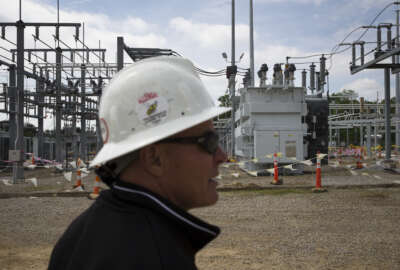
Trump’s pick to run Energy’s experimental research agency supports budget that would shut it down
The Trump administration's pick to run the Energy Department's experimental research branch says he supports the president's budget plan, which zeroes out funding...
Best listening experience is on Chrome, Firefox or Safari. Subscribe to Federal Drive’s daily audio interviews on Apple Podcasts or PodcastOne.
Early in his confirmation hearing Thursday, the Trump administration’s pick to run the Energy Department’s experimental research branch told senators he supports the president’s budget plan for his agency.
That raises concerns from members of the Senate Committee on Energy and Natural Resources, because President Donald Trump’s last two budget requests have called for essentially shuttering the agency.
“Of course, I support the president’s budget,” said Lane Genatowski, Trump’s pick to run the Advanced Research Project Agency-Energy (ARPA-E). “If I was confirmed as director, I’d obviously be an enthusiastic supporter of ARPA-E and all their projects.”
But Sen. Angus King (I-Maine) said he sees being an enthusiastic supporter of the agency and a supporter of the president’s budget as mutually exclusive positions.
“My first thought is, then why are you sitting here? The president’s budget zeroes out this agency. You can’t be two people. Do you support the president’s budget or do you think ARPA-E has an important mission?”
Genatowski, a Houston-based investment adviser, told King he’s ready to lead the agency, which hires top scientists and researchers to work on cutting-edge energy projects for three-to-five years, regardless of the contentious budget environment.
“I guess in my mind, I can hold both concepts, and they wouldn’t be inconsistent. If the Congress votes to appropriate money, and authorizes money to be appropriated to run ARPA-E, and the president signs the bill, there will be a budget for ARPA-E, and I’d like to be the person that runs it,” he said.
King also questioned why the Trump administration would nominate a 30-year veteran of investment banking, when ARPA-E’s last two directors both held doctorates in advanced technical fields.
“You’re a finance guy, not a scientist,” King said. “ARPA-E is a science agency, why should we confirm a guy to one of the most important science positions in the government who’s not a scientist?”
Genatowski explained that, if confirmed as ARPA-E director, his finance background would help him determine which technologies the agency should consider exploring.
ARPA-E invests in emerging technology deemed too risky for the private sector to consider, but Genatowski also promised to invest taxpayer dollars wisely.
“I think there’s some blend, and I don’t know you can tell at the initial starting gate, if you’ve got 144 projects, which ones are going to make it and which ones aren’t. If they all make it, you’ve not done a good job selecting enough science. If none of them make it, you’ve not done a good job selecting enough commerce,” he said. “I think it’s something you figure out as you go along, quite frankly.”
Sen. Lisa Murkowski (R-Alaska), the committee chairwoman, said Genatowski’s background in finance would help advance the agency’s mission.
“ARPA-E’s role is not to be the financer, but it is the one to be the facilitator. As an investor, you looked at some risky energy projects and chose to advance them. Some of them don’t always work, but if they always worked, they would be easy to finance. You bring a different perspective, I think an important perspective, and my hope is that you will share with the administration that there is strong support for ARPA-E within the Congress,” she said.
Sen. Joe Manchin (D-W.V.) questioned whether the White House sought to bring Genatowski to run ARPA-E, or to help dismantle it.
“The intent is to close down ARPA-E — intent from the administration, which must be coming from the recommendation from Secretary [Rick] Perry, or the Department of Energy or someone within the White House,” Manchin said. “Did they bring you in to close it up? Kind of put the nail in the coffin, as we say?”
Genatowski said he knew the Trump administration proposed eliminating funding for ARPA-E when it sought him out for the director job, but denied being hired specifically to shut down the agency.
“Not one minute was I talked to about closing it up,” he said. “The people that vetted me, I guess, picked me because they thought if it wasn’t closed down, I could add something.”
Murkowski said the president’s budget plan often proves to be a bitter pill to swallow, but also acknowledged that those spending budget plans often fall by the wayside once lawmakers approve a spending package.
“While I understand that there is an expectation that you would say you support the president’s budget, my hope is certainly that when you have the opportunity to weigh in as that is being formulated, that we won’t be looking at next year’s budget coming out of the White House and seeing ARPA-E recommended to be zeroed out,” Murkowski said. “We will then know that you’ve really put your shoulder to it – you’ve helped educate those folk, you’ve shown them what value you can bring. I do believe that you can bring that value.”
In the “minibus” package of spending bills the Senate passed Aug. 1, ARPA-E would receive a $375 million budget for fiscal 2019. The House passed a spending bill in June that would give the agency a $325 million budget.
The agency received a $306 million budget in fiscal 2017.
Even if it’s saved from the cutting-room floor, ARPA-E still faces consolidation as part of the Trump administration’s larger government reorganization plan in released in June.
That plan calls for moving all of the Energy Department’s applied energy programs, including ARPA-E, into a single Office of Energy Innovation that promotes and funds research and development.
Top Energy lawyer nominee weighs in on cyber office
The committee also heard from William Cooper, the Trump administration’s pick to serve as the Energy Department’s general counsel.
When it comes to cyber issues, Cooper, if confirmed, would help manage communication between the Energy Department and other agencies like Federal Energy Regulatory Commission (FERC), the Department of Homeland Security, the North American Electric Reliability Corporation (NERC) and the private sector.
The next general counsel would also work closely with the Office of Cybersecurity, Energy Security, and Emergency Response (CESER) Perry stood up in February to protect the country’s energy infrastructure from cyber attacks.
“This is going to be an office that we’re all paying very close attention to,” Murkowski said. “There are those who suggest that cybersecurity has to be designed into every aspect of system operation and that a separate program might actually be counterproductive. I hear that argument – I happen to look at this and say we’ve got a significant issue going forward, and think that an office is important.”
Cooper said he would, if confirmed, advise and consult the agency on developing CESER.
“I’m aware that the office has been established, I’ll leave it to the policymakers as to whether there should be an independent office, or whether it should be integrated.”
Copyright © 2025 Federal News Network. All rights reserved. This website is not intended for users located within the European Economic Area.
Jory Heckman is a reporter at Federal News Network covering U.S. Postal Service, IRS, big data and technology issues.
Follow @jheckmanWFED
Related Stories





